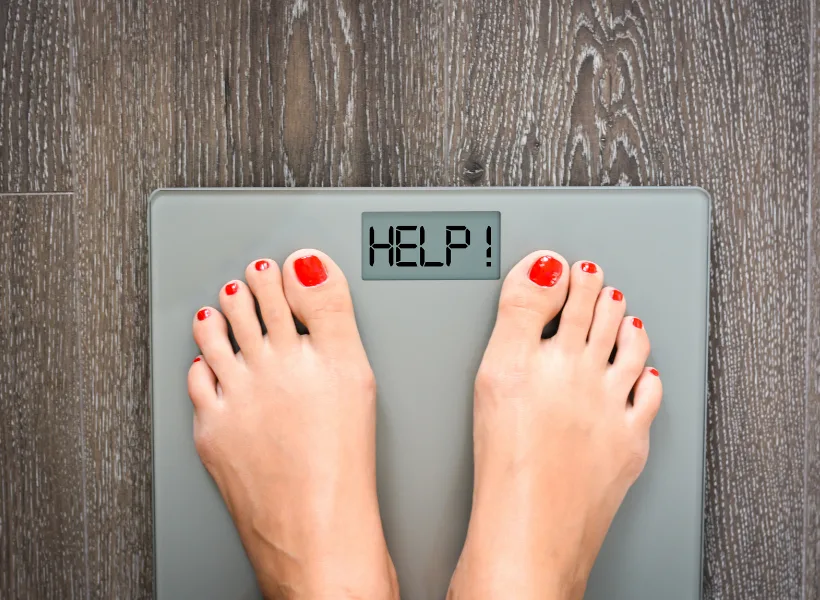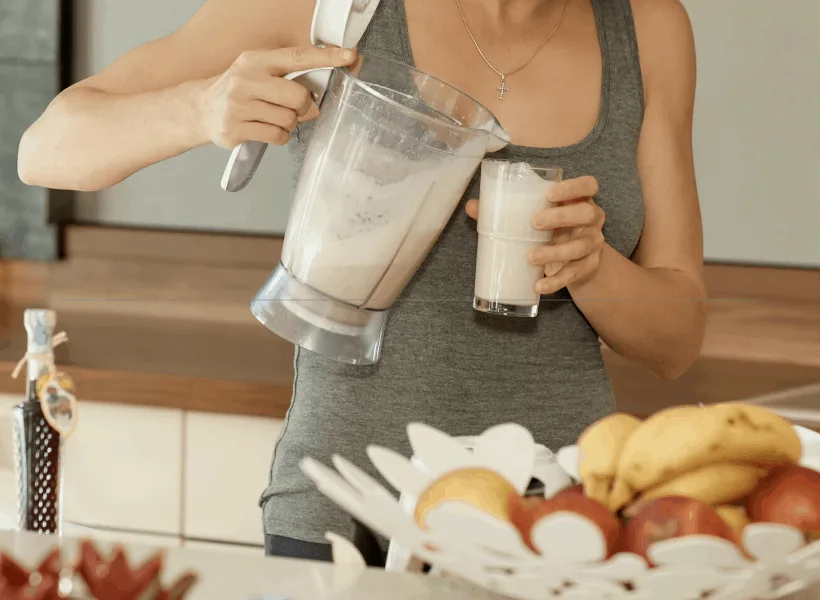Have you ever wondered how long chicken can sit out before going bad? Chicken, without a doubt, is the number one protein used for meal prep and for quick weeknight meals.
Its neutral flavor allows for a wide variety of amazing protein loaded recipes that are family favorites. Another great benefit to cooking with chicken is that not only is it healthy, but there are also many chicken recipes that are great for weight loss!
Chicken is an iron-rich meat the lends itself to so many different combinations of seasonings, flavorings and preparations. It’s loaded with B and E vitamins as well as minerals like zinc and copper.
That’s why I try to incorporate chicken into my weekly meal planning at least once or twice a week. Some of my favorite chicken recipes I keep in rotation is this Sheet Pan Chicken, these Chicken Fajitas, this Dutch Oven Chicken and this yummy Creamy Chicken Noodle Soup.
Even though chicken has a bad reputation for being difficult to handle safely, especially when it sits out too long, it truly isn’t difficult to learn how to store, prep and prepare chicken safely and deliciously. I hope this article will clear up any hesitations you may have.
How Long Can Raw Chicken Sit Out at Normal Room Temperature
When cooking with raw chicken meat, food safety is very important. Once you remove your uncooked chicken from the fridge, the United States Department of Agriculture recommends, as a general rule, that you do not let it sit out for more than a couple of hours, at the longest.
If you live in a warmer environment, or if your kitchen is warmer than 90 degrees, after one hour the chicken is no longer safe and should be discarded.

How Long Will Raw Chicken Last in the Fridge?
We have all done it! We begin meal prepping for the week but then life happens, and we end up getting sidetracked. So, we throw everything in the fridge and before you know it, the day is gone. If this has happened to you with chicken you purchased, you may be glad to know that fresh raw chicken stays good for up to two days.
If you end up being delayed in cooking it, it’s better to go ahead and throw it in the freezer after the first day, than to risk the chicken having bacterial growth that can make you sick.
Why Doesn’t Raw Chicken Stay Fresh Longer?
There are two main reason raw fresh chicken does not last very long, whether it’s in the fridge or sitting out-temperature and exposure to air.
Temperature: Anytime food reaches 40 degrees Fahrenheit, bacteria will start to multiply several times faster than normal. Once the bacteria begins to breed, it will make raw chicken inedible and can eventually cause numerous health hazards.
Air Exposure: When raw chicken is exposed to air, dangerous bacteria doubles in density compared to chicken that is stored in an airtight container.
How Can You Tell if Raw Chicken Has Gone Bad?
There are several tell tale signs of that your chicken has gone bad. But keep in mind, in the early stages of chicken going bad, the signs may not be very apparent. Here are a few things you should look for:
- Smell: Rotten chicken has a foul smell that’s almost a sulfur like odor. Fresh raw chicken should smell very neutral or odorless.
- Texture: When buying chicken, look at the raw meat to see that it has a glossy but not slimy texture. Chicken that has gone bad will be sticky to the touch and will feel slimy. That’s because the surface of the chicken has started breaking down allowing bacteria to set in.
- Color: Fresh chicken will look slightly pink or pale and the fatty pieces around the chicken will be white. Chicken that has past its prime will begin has some gray spots on the flesh and the fat will turn yellow.
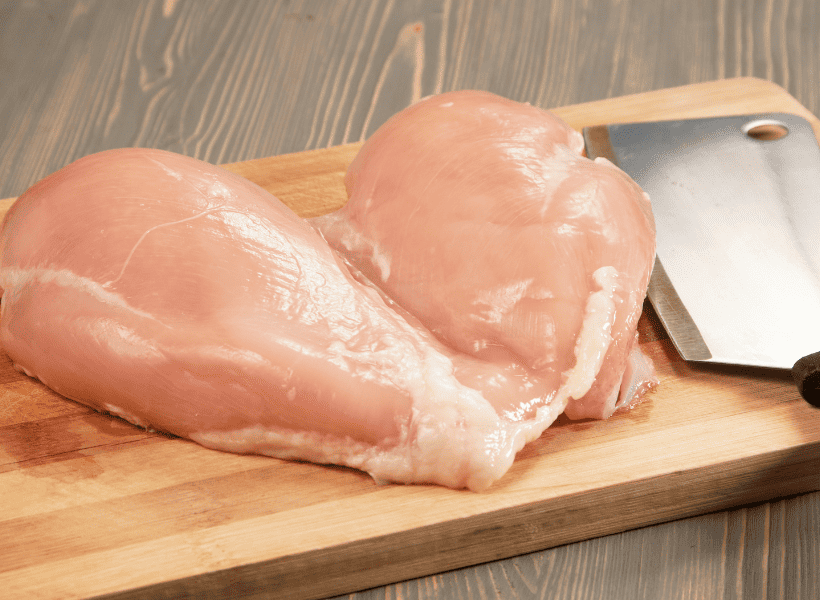
How Long Can Cooked Chicken Sit Out
If you have leftover chicken or any type of poultry dish like chicken salad or chicken casserole, it follows the same two-hour rule as raw chicken.
It’s just an overall bad idea to leave any meat or dairy items, whether cooked or uncooked, sitting out too long. Leftovers are great for meal prepping, but to avoid the risk of food poisoning, its best to get this type of cooked food into the fridge once they have cooled to room temperature.
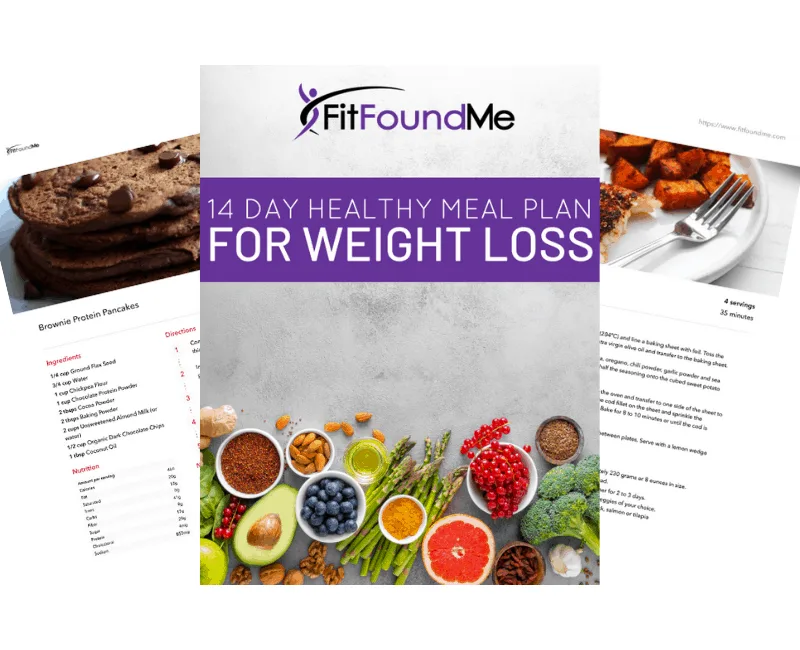
14-Day Healthy Eating Meal Plans: 1500 Calories
Take the guess work out of healthy eating. No more searching for healthy recipes. 78 pages of recipes with calories, macros, and shopping lists — all included!
Ways to Extend The Shelf Life of Chicken
- Making sure you get the most extended period of time from your chicken starts at the grocery store. The first thing you should do when buying chicken is look at the expiration date or the “best used by” date on the label. I always search for packages with the furthest date to buy me as much time as I can get.
- Another great tip is if you are like some people, you can end up with an extensive shopping list at times. If that’s the case, you’ll want to shop for all your perishable food items last. Let any chilled food products be the last thing you add to your cart before checking out.
- If you are traveling a long distance with your groceries, you may want to consider investing in a cooler bag that will help chilled items stay cool. Or you could even bring a small ice chest packed with several frozen chest ice packs.
- Once you’re home, you’ll want to unpack and store meat away in the coldest part of the fridge before you unpack boxed and canned goods.
What’s the Best Way Freeze Chicken?
Most all raw chicken is sold in those foam trays with a thin layer plastic wrap. Though that’s acceptable packaging until you get it home in the fridge, it is not suitable for freezing.
To prevent freezer burn, wrap the package of chicken with a layer of heavy-duty aluminum foil. You can also remove it from the packaging and place it in freezer bags, and press out as much air as possible. If you have a food saver machine, they work great to help seal and remove air from the bag.
In this article from the USDA, it states the following when it comes to the time limits that are safe for freezing chicken: “If kept frozen continuously, chicken will be safe indefinitely, so after freezing, it’s not important if any package dates expire. For best quality, taste and texture, keep raw whole chicken in the freezer up to one year; chicken pieces, 9 months; and giblets or ground chicken, 3 to 4 months.
How to Safely Thaw Frozen Chicken
To prevent bacteria growth that can cause a foodborne illness to other areas in your kitchen, you should avoid thawing uncooked chicken or any raw food items directly on the kitchen counter. Instead, place the uncooked chicken in a class dish, sealed container or airtight bag in the fridge overnight.
If you happen to forget to do this the night before and need to thaw it quicker, you can thaw it in a cold water bath. You do not want to use hot water or even warm water when thawing chicken because the outside of the chicken warms up before the inside has had time to thaw.
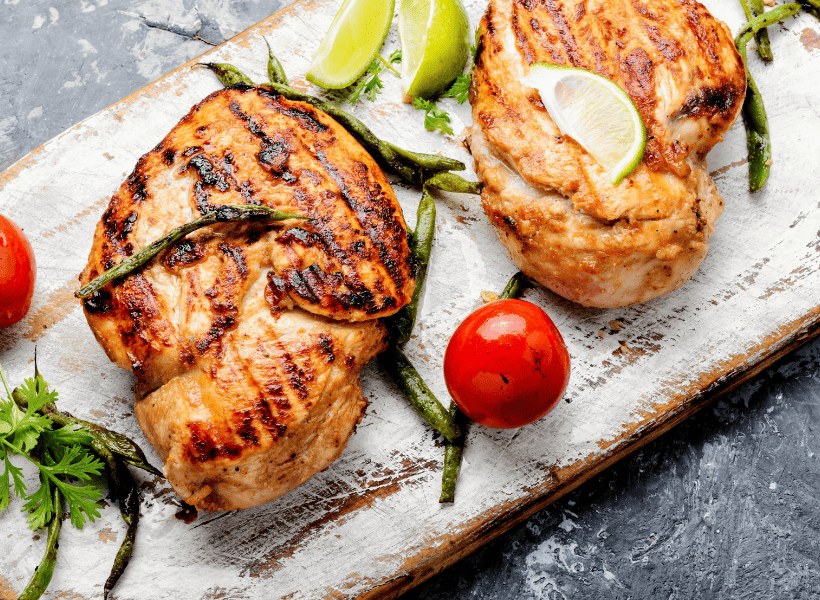
Does Barbecue Sauce or Marinade Help Preserve the Chicken?
Trying to extend the freshness of chicken by adding it to BBQ sauce or a type of marinade does not prevent the growth of bacteria at all. It does not matter if it slathered in sauce, raw poultry reaches the same danger zone as it would without sauces or marinades.
A word of caution about marinating chicken for long periods of time. Depending on the marinade you use, the seasonings could actually cover up the first few signs, like the color and a bad smell, that tell you the chicken has gone bad.
What Health Issues are Caused By Ingesting Bad Chicken?
Eating raw or bad chicken can contain harmful bacteria that can cause serious health problems. Salmonella bacteria is the most common issue you’ll find in bad chicken but there are others you should be aware of. Here are some of the most common:
- Enterococcus
- E. coli
- Campylobacter jejuni
- Staphylococcus aureus
- Listeria monocytogenes
The symptoms you may experience may be mild to severe and consists of fever, headaches, nausea, vomiting and diarrhea. The time it takes to feel the effect of any of these bacterial infections ranges from 2 hours all the way to 36 hours.
The good news is most of the symptoms will go away on their own without seeking medical treatment. However, if you’re still experiencing severe side effects after 48 hours, you need to contact your medical professional.
How to Handle Raw Chicken
- Before handling chicken or any raw meat, make sure you wash your hands before and afterwards. It’s not a bad idea to invest in some disposable kitchen gloves to keep on hand as well.
- Use a dedicated cutting board that is used just for cutting raw meat. This will help avoid transferring bacteria to other foods.
- Once you have finished preparing the chicken, sanitize all the utensils or other items that have come in contact with raw chicken.
- If you placed a packet of chicken on the shelf in your fridge, wipe that surface down well with Clorox wipes.
- No matter what you may have been told, NEVER wash raw chicken. It is not needed and will cause more harm than good.
What Internal Temperature Should Chicken Be Cooked?
The time it takes to cook chicken to a safe temperature depends on the type of meat and the cooking process. The best rule of thumb to determine if chicken is done, is to use an instant read food thermometer to check the temperature of you chicken in the thickest part.
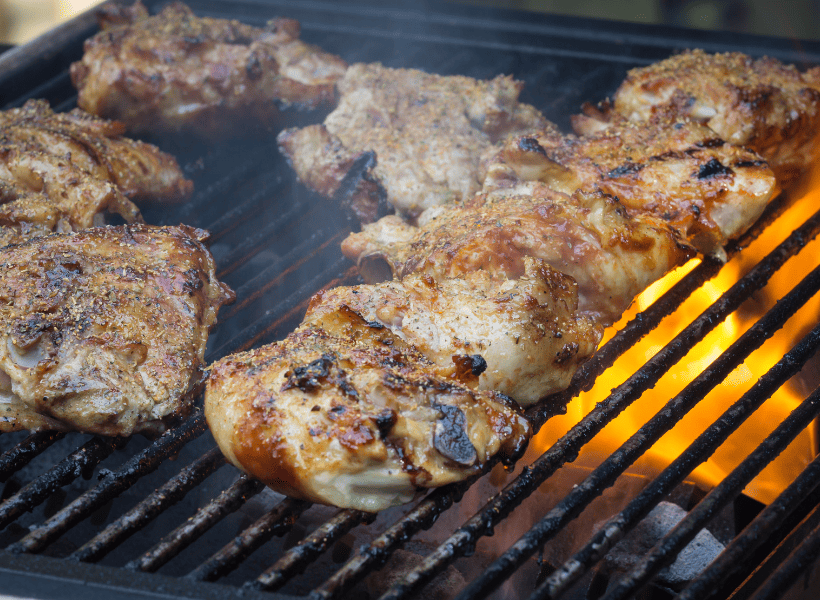
How to Tell Chicken is Cooked Properly
Without a doubt, the best way of gauging the doneness is to check the temperature of your chicken with a meat thermometer. Properly cooked chicken should read 165 degrees F in the thickest part of the chicken. If you don’t have a thermometer, there are a few other visible ways you can check.
- Make a small slit in the thickest part of the meat. The juices should run clear. If the juice is still red or pink, it needs to continue to cook.
- When you cut cooked chicken breasts in half, the meat should look white all the way through. If not, you need to continue cooking it until it is. Keep in mind, the flesh around the bone in bone-in pieces of chicken will have a pink tint and that is okay as long as the juice is clear.
- Texture is another good visual gauge. Properly cooked chicken should fill firm and should tear apart easily. If you are boiling chicken for chicken salad or a casserole, you can stick a fork into the chicken. If it turns loose easily and the chicken feels tenders, it’s mostly likely done.

